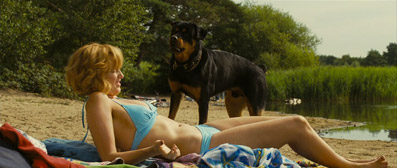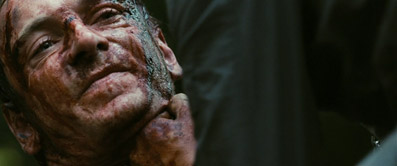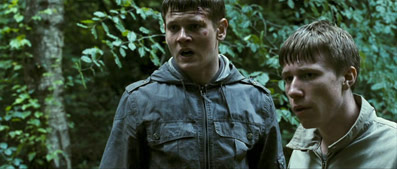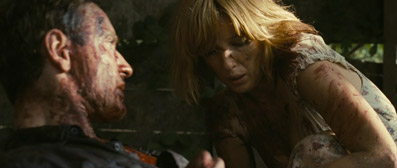|
From the opening frames of Eden Lake, I was acutely aware of being crudely manipulated regarding how I should feel about the film's central character, Jenny. She's a teacher, you see, a kindly, smiley one who works with wide-eyed young kids. Ah, right, then she must be a nice person, a good person, one who'd never hurt anyone and who you'd never want to see come to harm. She's off for a weekend at a secluded lake with her boyfriend Steve, a location he assures her will take her breath away. It's actually a flooded quarry, one of those artificially created lakes around which construction is soon to start on a gated community, an imported symbol of social paranoia and isolation that's done rather well in America. The signs and fences prove no barrier for Steve, who knows his way around and drives a terrain-busting Chelsea tractor.
After parking in the woodland, the pair plonk themselves down by the lake to enjoy the quiet and each other's company, but their seclusion is disrupted when a group of kids settle down in what is probably their own favourite spot a couple of hundred yards down the bank, armed with a ghetto blaster, a really big dog and a collective attitude. Jenny's in favour of moving on but Steve is having none of it, telling her flatly that he's not going to be "bullied by a bunch of 12-year-olds." They thus just lie there and sunbathe and even doze off, in spite of the noise and the way the kids are eyeing Jenny up. Steve eventually asks them to turn the music down but they take the piss out of him and tell him to fuck off. Eventually the kids move on and Steve gets the tent out. Wait a minute, they're camping here? At this point I began to suspect that our Steve has never taken any serious steps outside of rural Buckinghamshire. But let's cut him some slack here. He's been to the lake before and there's never been a problem, and they are kids after all – unpleasant and foul mouthed for sure, but kids nonetheless. And they leave. Why would they come back?

Surprisingly, they don't, and Jenny and Steve get a good night's sleep, but their drive into town for breakfast is delayed by a broken bottle strategically placed against the tyre of their car. A wheel change and a café cuppa later, Steve sees the kids on their BMX bikes and gives chase, but they easily give him the slip. When he spots their bikes piled outside a house, however, he has no intention of just letting things be, despite Jenny's protestations. He approaches the house, and on finding no-one around and the door wide open, just ambles in and even trots upstairs, presumably in search of a parent to talk to. But when that parent suddenly arrives home he has a sudden change of heart and clambers out of a bedroom window onto the roof to escape. The thing is, located just below are the very same kids from earlier, whose collective noise was somehow completely inaudible to the Steve until it came time to flee.
Now I know we're talking horror movies here and I'm fully aware that this is a genre where logic often takes a back seat to the mechanics of tension building. But Eden Lake has chosen to dress its tale in a coat of social realism – or at least its own version of it – and with that comes an expectation that any presented dangers and escapes will at least be grounded in reality, and that, for me, is where half of its problems lie. As for the other half... well, it may depend on just how seriously you take those tabloid scare stories about psychotic, knife-wielding youngsters and their role in the disintegration of society. Or rather a specific portion of it.
But to get back to the plot. Steve and Jenny return to the campsite and go for a swim, but on their return they discover that their beach bag has vanished and with it Steve's wallet, car keys and mobile phone. Their car's also gone, of course, though it soon reappears when the very same kids from earlier drive it straight at the couple, laughing at the fun of it and then speeding into the woods. Steve and Jenny eventually locate them and Steve tries to negotiate the return of his goods. This I absolutely bought – he needs his stuff back and this far from town what other real option does he have? The kids, particularly their surly leader Brett, aren't interested in playing ball. Tensions boil over and a knife is pulled. In the struggle that follows Steve somehow grabs the weapon and accidentally kills Brett's dog, a contrivance that frankly throws credibility to the four winds, but serves the story's purpose of turning a conflict into all-out war. A distraught Brett throws them their car keys and tells them to go, but grief soon mutates into anger and the kids give chase. When the car crashes, Jenny and Steve become separated – Steve is captured and tortured by the group, while Jenny finds herself hunted and fighting for her life.

Let's get one thing straight – Eden Lake is a well made slice of survival horror that successfully pushes a number of tension buttons and features a committed pair of performance from Kelly Reilly as Jenny and Michael Fassbender as Steve. In terms of incident, there is little that genre devotees won't have seen before and even a few hoary clichés to cope with – a perceived real scare turns out to be a boyfriend gag; a car gets stuck in the mud just long enough for the approaching threat to become imminent before finding its traction; a fleeing victim is brought down by a foot injury – but all are technically well executed, and if you buy into the characters and the story then there are some serious wind-ups to deal with here.
The problem for some, myself included, is that the film wears is socio-political subtext like a sequined overcoat, and in doing so paints a jaundiced portrait of modern society that plays less like social commentary than a cinematic expression of media-fed, middle-class paranoia. In Eden Lake, we're looking at class war from a protectionist bourgeois perspective, one in which everything that is good and decent about society, as represented by the couple at its centre, is under threat of violent eradication from an increasingly barbaric and destructive underclass. Here the middle class is shown to be decent, caring, loving (Steve has brought Jenny to the lake to propose marriage), intelligent, cultured, resourceful, brave and resilient, while their working class tormentors are portrayed as savage, foul-mouthed, defensive, deceitful, cowardly, violent, amoral, and a whole lot worse.
Of course you can make a case that the above claim is as blinkered as the one I'm accusing the film of, but with no balancing characters on either side of the class divide, the film itself limits any potential alternative reading. These are not kids who have strayed from the straight and narrow but products of their own families and community, endemic of a society and even a civilisation in cultural freefall. That their leader is revealed to be a borderline psychopath does not provide a convincing get-out clause, given that this raises more questions than it would potentially write off (he commits extreme acts with an ease that suggests he's been getting away with it for some time) and that this very character is used to hammer home these thematic elements in the final scene. And from the moment Steve and Jenny enter this alien community they are confronted with a string of examples of its self-centred nature – bike-riding kids (yes, those guys) cut them up at traffic lights, a driver steals a parking space they were patiently waiting for, a barman reluctantly breaks off a conversation to serve them, a woman slaps her young kid and glares at them for their shocked looks, and a couple row noisily in the street outside when our pair bed down for the night, all in a few short minutes of screen time.
This cultural pigeonholing is emphasised by the objects by which the characters are defined. Steve drives a Range Rover with a prominent sat-nav system, goes scuba diving in the lake and wears Ray-Ban sunglasses – it's surely no chance thing that the theft of his bag robs him of his wallet, mobile phone, car keys and designer specs, all symbols of his material worth and social status. The kids, meanwhile, ride BMX bikes, play garage music on their ghetto blaster (actually phones are the player of choice these days, but that probably wouldn't be loud enough to get up Steve and Jenny's noses), have a dangerous and untethered dog and record their violence on a mobile phone, while Brett's Dad is a stroppy tradesman who drives a white van and is a likely model for his son's communal bullying (a key element that needs exploring in more detail than the passing glance given here).

This delineation extends to how the characters develop. As the kids become more desperate and barbaric and the group unity begins to crumble (another aspect that deserves more screen time), Jenny displays the strength and ingenuity of a marine commando, able to spirit herself silently onto a roof to evade capture, pull up a floor and replace the boards at lightning speed to hide herself and the injured Steve beneath, and to push a large spike right through her foot to remove it and then run through the woods with only a trace of a limp. When her way is barred by a tall spiked fence I fully expected her to vault clean over it rather speed along its length in search of a way though. Her descent to the barbarism of her pursuers is a genre staple (as is the early disabling of her would-be male protector to allow the pursuit of a single white female) and is symbolically completed when she becomes smothered from head to foot in blood, mud and shit and is able to kill on instinct alone, only to instantly recover her humanity and react with weeping horror at her actions.
As an exercise in survival horror, Eden Lake treads a familiar path in different dressing, but does so with assurance, energy and a gut-wrenching attention to technical detail – Steve's wounds are horribly realistic and his struggled attempts to free himself from bared-wire bonds are guaranteed to get you wincing, even if you survived the earlier knife-in-the-mouth assault. But its view of society is torn from the worst nightmares of a paranoid Daily Mail reader and a frankly depressing reflection of the media-fed fear that encourages us to make sweeping judgements based on the reported actions of a small minority. It's a film I can see having a future life as evidence for the prosecution in the argument that society is on moral and ethical decline. It might even find worth as an inverse commercial for future UK based gated communities like the one at Eden Lake, in which the fearful will elect to isolate themselves from a society they believe is threatening their very existence.
If you've been victim to youth violence in recent times then you may well identify more closely with the lead characters. I'll admit that I've yet to suffer a serious assult, but I've certainly had my share of close calls, including a threatening incident only a couple of nights ago that could have gone either way, but I do not buy into the view that this is somehow representative of a particular social group or class. Both director Watkins and producer Colson state in the extra features that it was never their intention to make a social realist drama and I fully accept that. But one of the major strengths and fascinations of the horror genre is its tendancy to subtextually reflect the fears of the societies in which the films are made. That Eden Lake embraces this is not an issue, but its exclusion of any character who might not in some way be part of this collective threat can't help but suggest that the danger is communal or societal rather than the result of a chance encounter with a single lunatic and his easily led cohorts.
A pristine anamorphic 2.35:1 transfer with rock solid colour and contrast and no evidence of compression artefacts or the washing out of black levels, even in the darker scenes. I've not seen the Blu-ray version, but on the evidence of the DVD I would imagine it looks gorgeous.

The favourite pairing of Dolby 2.0 stereo and 5.1 surround are on offer and although both are crystal clear and seductively mixed, the 5.1 track is, as so often, the more impressive of the two, displaying a strong but not overpowering bass and some very specific use of the front stage and surrounds for location and specific effects (the door beads when Steve enters the house is a good example).
A decent-looking collection of extra features are included, although many are shot and structured in a similar style (most of the interviewees are asked to describe the plot, for example) and feel like small parts of a longer whole.
Interview with James Watkins (8:35)
Watkins talks about how the film was conceived (a girl flipped a book he was reading and started a chain of thought about confrontation and symbolic emasculation), working with the actors, the characters and plot, filming the torture scene and the audience reaction. He is also asked to speculate on whether Steve was right to confront the kids, given what happened as a consequence.
Interview with Kelly Reilly (7:45)
The film's lead actress talks about the film's plot, her character (nice, regular and middle-class), her initial reaction to the script, and working with her co-star and young Jack O'Connel, who plays Brett. She has trouble placing the film in a specific genre (sorry, but it's survival horror, no question) because of its reality, and rather worryingly describes the included social issues as being "everywhere" and the film as a "documentary on part of youth culture." There are some spoilers here, so don't watch this before the film.
Interview with Michael Fassbender (4:54)
Mr. Fassbender (who is brilliant in Steve McQueen's Hunger, by the way) talks about working with his co-star, his initial reaction to the script, the problems of the generation gap, decisions made by his character, and the dynamic of the gang that his character falls victim to.
Interview with Thomas Turgoose (4:36)
It's a little odd that of all the actors playing gang members, only the likeable Turgoose, star of Shane Meadows' This is England and Somers Town, is interviewed here, especially given how under-explored his character is in the film (he plays the inexperienced young weak link Cooper, although he does have an important role in the narrative progression). He talks briefly about his character, how he landed the role, his initial impressions of the script, working with the director, the toughness of shooting the torture scene, and the positive aspects of making the film.
Interview with Christian Colson (6:47)
Producer Colson also describes the plot (I think we've got it by this point, thanks), his reaction to the script, and working with first-time director Watkins, actress Kelly Reilly and actor Jack O'Connel. Like Watkins, he is asked to speculate on whether Steve was right to confront the gang. He also states that they were not trying to make a social realist drama. Fair comment, but...
Behind the Scenes (5:49)
A ramshackle but still interesting collection of iffy quality DV footage of the shoot. Another one to steer clear of until after the film, though.
Q&A with James Watkins (16:16)
Not part of the interview collection above, this nonetheless covers some of the same territory. Issues discussed include the inspiration for the film, the creation of the story, the characters (this is interesting and has a few surprises), the shoot, the actors, the violence, its social relevance (he freely admits the film is a paranoid fantasy), violent material that didn't make it to the final cut, working with the younger actors, and the importance of peer pressure to the story and opposing reactions to the film. Again this includes major spoilers, including discussion of the ending, so should not be viewed before the film.
TV Spots (1:00)
Four of them, and I'm guessing they're for the American release from that voice-over.
Theatrical Trailer (1:48)
A rapidly edited promo that delivers the expected sell.
Extreme Trailer (2:03)
Similar to the above, but with added nastiness and swearing.
I've said my piece and feel free to completely disagree. If you do then Eden Lake largely delivers on its survival horror credentials, despite a fair few credibility issues and people-in-peril clichés. Whatever your view of the film's social sub-structure, there's no doubt it provides some fruit for debate. The transfer is excellent and I'll bet the Blu-ray looks superb, and although the extras are sub-divided to look more plentiful than they are, they are still all of interest.
|